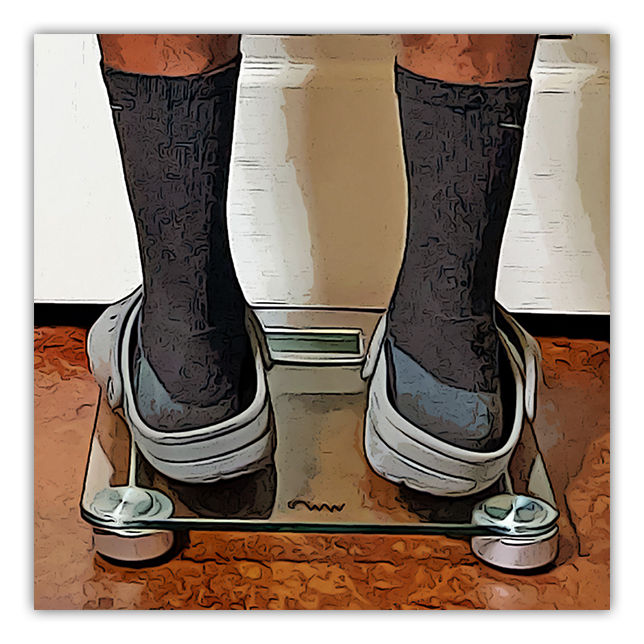11 Causes Of Weight Fluctuation And How To Control It
Weight fluctuation hits home, every home in fact. If we had some smart technology that displayed your weight hour by hour.. Minute to minute it would look like shares of a public corporation - up and down like a burpee. This is normal, but discouraging if you haven’t an understanding of why. The scale may be all over the place, yet that doesn’t mean your efforts are for naught. Here’s why your weight does what it does, how to limit the madness, and how to account for it.
Weight Fluctuation
What Your Weight Is comprised Of
When you step on the scale, with you is every fiber of your being. I mention this for clarity, whether you’re checking the poundage to estimate muscle growth or fat loss it’s all there. Adipose tissue, water, bones, muscles, joints, ligaments, organs, unmoved bowels, ready to go urine - everything.
How could your weight possibly not fluctuate?? With that out of the way let's get into what exactly leads to fluctuation then how to best gauge results despite your body’s uncanny ability to do the LB wave.
What Causes Weight Fluctuation
The average person’s weight fluctuates about 5.5 pounds a day. You could wake up 157 and lay down 163, even when dieting for weight loss. Again - regularly scheduled programming. I’m on the higher side of fluctuation, by bedtime I’m 7-8 pounds up from when my start the day alarm rings. Happens to us all and here are some of the causes:
Inconsistent Calories
If your diet was superposable day to day, weight would fluctuate. What do you think will happen if your food intake has no rhyme or reason? 5,000 calories today and 2,000 tomorrow will have your scale on that old Kris Kross. Food isn’t weightless, so the contrasting loads will influence your weight. Then there’s the type of food and the responses they elicit IE water retention, excretion, or slow digestion.
Glycogen Storage
Glycogen is stored in the body as a catalyst for anaerobic energy. Consume carbs? You’ll store glycogen. As you hoard and empty glycogen stores your weight will respond, for every gram of glycogen stored attracts about 3 times its weight in water. So you retain more water (in the right places) when you store glycogen.
Medication
Medication creates changes in your body, of course. It’s the reason you take them. But outside of their intended use there can be side effects like: decreased or increased blood flow, decreased or increased urination, decreased or increased bowel movements, decreased or increased energy, decreased or increased water retention, and so on. All encroach what number you see throughout the day.
Alcohol Intake
Booze isn’t without consequence: less quality sleep, blood flow decrease, and more. For today’s topic it’s about dehydration. Alcohol is a diuretic, meaning it’ll send you to the urinal or toilet (hi ladies) with frequency. More urine? Less water weight temporarily.
Sickness
Under the weather? You may be under the weight you’re accustomed to. Sickness often teams with dehydration and loss of appetite. Eat less, you’ll weigh less - remember food has volume. Still don’t mistake all weight loss as loss fat, the scale weighs everything.
Biological Processes
These vary wildly, but should be noted: your time of the month, just boo-booed, need to boo-boo, constipated and can’t boo-boo, holding your urine, just urinated, and on it goes.
Electrolyte Balance
What’s your potassium to sodium ratio like? If it lacks consistency so will your weighted results. High sodium intake with low potassium leads to extra water retention, in the wrong places might I add. It’ll give you subcutaneous water, which is referred to as spillage making your muscles appear flat.
Sweating
Had a recent sweat session? Time to fluctuate Jacks and Jills. This point piggybacks off of electrolyte balance, since you lose electrolytes, but in addition water isn’t weightless. Sweat is mostly water, sooo you will see that difference on the scale.
While I have your attention.. Sweat isn’t an indication of fat loss. It’s an indication of your body trying to cool itself. If it was you losing fat, anyone that needed to lose adipose tissue would just spend their weekends at the beach. Fat loss comes from a calorie deficit, not your body’s attempt to maintain a stable core temperature.
Hydration Level
What’s your water intake like? I mentioned dehydration taking the scale down. Going from low water intake to a decent amount causes temporary extra water retention. This lasts a few days until your body makes adjustments, but drink up.
Fasted Versus Fed State
Eat yet? The scale will notice. Your weight before and after a meal will change as it does before and immediately after a beverage, especially when compared to your first thing in the morning results.
Stress
How good are you at managing stress? When you stress cortisol is released.. This makes fat storage and water retention more likely even if your diet is of quality construction. More on that here - ways to manage your stress.
Lack Of Sleep
Not logging the appropriate amount of Zs? Then you’re stressing - releasing cortisol and you know what that means.. Out of whack metabolism, adipose tissue is more likely to accumulate, and you retain water. Try a supplemental nap.
How To Limit Weight Fluctuation
At this point you have a clear understanding: weight fluctuation is inevitable. What can be changed is you continuing to not have the knowledge to maneuver these fluctuating streets.
To minimize weight fluctuation you need consistency of diet. Have a plan, have a strategy and be aware of how that plan & strategy will affect your weight.
For instance if dieting for fat loss you may try carb cycling. Carb cycling will give you some high and some low carb days. This leads to varying glycogen levels leaving you with varying levels of retained water.
Still consistency is a mitigator. Same with water, keep it consistent.
How To Account For Weight Fluctuation When Tracking Progress
So how do you know you're progressing if your weight seems to be all over the place? A few ways.
When utilizing a scale weigh yourself at the same time, in the same condition, and with the same tools. The best consideration for this is upon wakeup while still fasted before even sipping water, but after your morning bathroom trip. This will be as close as you can make yourself to future states for future comparisons.
With that covered, understand that weight change is not a straight line, it’s volatile. For this reason use a weekly weight average to compare results. Add your Monday-Sunday results, divide them by 7, and compare that number to the next week for a more accurate depiction of your progress or lack thereof.
Note: it’s great to use progress pictures, body fat calculations, and tape measurements to see progress, as well.
My Thoughts
My aim is to say - don’t stress if your weight is up from this morning. All of our weights are up from this morning.
I comprehend the displeasure that accompanies a perceived lack of progress. This frustration leads to non-compliance and ultimately giving up in many cases.
You may be making progress and think otherwise, then believe ”I just can't lose weight, nothing works” - that’s a confidence killer and it’s wrongheaded. Everyone can lose, or gain weight for that matter.
So, It’s About That Time
Your weight is bound to fluctuate, it's part of the game. Losing or gaining isn’t a straight line so prepare for eaves and flows even within a day. There are many biological factors at play.. Roll with it and plan accordingly. Use your weekly weight average, stay consistent, put those muscles to use, and Be Great.



